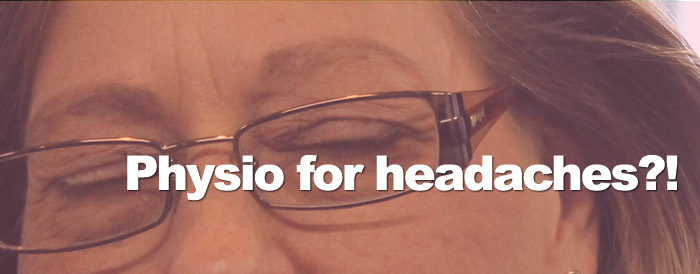
Physiotherapy to Fix Your Headache


Headaches are a common ailment experienced by many people. Headaches are known to have a number of causes, and the treatments are as varied as the headache symptoms themselves. Many of us accept headaches as unavoidable and are often treated with over-the-counter or prescribed medications. For some people, headaches can be quite debilitating and also resistant to traditional therapies. One possible therapeutic option that is less well-known to the general public is physiotherapy. Headaches that are “mechanical” in nature – emanating from the joints or muscles around the head and neck often affected by movement or positioning – can often be effectively treated with physiotherapy.
Mechanical headaches can come in several forms. The first type of a mechanical headache is a secondary consequence of neck problems. People who have neck pain, stiffness, or loss of movement may have accompanying headaches but may not associate their pain with a neck problem. If the headache symptoms began around the same time as the neck symptoms did, there is a good chance it is mechanical and therefore treatable with physiotherapy. When the neck symptoms are addressed by adopting exercise and postural strategies that your physiotherapist can show you, the headaches tend to fade away. Or, as neck movement improves with physiotherapy treatment, a noticeable reduction in headache intensity is experienced at the same time.
The second category of a mechanical headache is one where there is no or very little neck pain or stiffness, with the head pain being the primary symptom. If this kind of headache varies with seated positioning, such as worsening with prolonged slouched sitting at a desk and improves with more upright posturing, then the pain source is likely mechanical. And there’s an increased likelihood the headache will respond to physiotherapy treatment.
Often, people mistakenly attribute headache symptoms to “stress”. In reality, someone in a stressful situation is less likely to pay attention to their posture and positioning, which can ultimately lead to a headache. Most of the time with these types of headaches there is a key position or movement that if performed repetitively, or held as a stretch can give rapid relief. The responsiveness to treatment varies from person to person.
This is not to suggest that all headaches are mechanical. There are many headaches that will not respond to physiotherapy treatment. If your headache is constant and doesn’t vary with positioning or movement, it is less likely to be mechanical. Determining whether positioning and/or specific movements are the root cause is something a well-trained physiotherapist can help you with. Two or three appointments would usually be a sufficient amount of time for a therapist to determine whether your pain is mechanical. If you decide to see a physiotherapist for your headache and it’s determined that the pain is not mechanical in nature, you will be referred back to your doctor.
If you have a persistent headache that is not responding to medication, put down that pill bottle and pick up the phone to make an appointment with a physiotherapist. A visit to a registered physio will get you a comprehensive assessment to see if your headache has mechanical features – a McKenzie trained physiotherapist can help with this. If the cause it mechanical, they will be able to show you how to self-manage it and what to do to prevent it from coming back which can be a wonderful option that excludes the need for pills. It is surprising how rapidly this approach can work, even with headaches that have previously persisted for months or years. Explore your options; a physiotherapist may be able to offer you quick relief allowing you to return to living your life – hopefully, full of activity.
Comments are closed.

